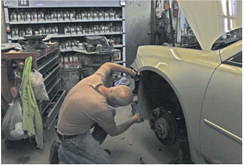Performance issues can affect older vehicles


Modern cars have much longer life spans than one may expect. Not too long ago, drivers often commemorated the milestone of their vehicles reaching the 100,000-mile mark. However, ...


Modern cars have much longer life spans than one may expect. Not too long ago, drivers often commemorated the milestone of their vehicles reaching the 100,000-mile mark. However, ...